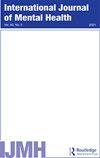COVID-19 lockdown and mental health: Exploring triggers of mental health distress among women in the Copperbelt province, Zambia
IF 1.7
Q3 PSYCHOLOGY, CLINICAL
引用次数: 5
Abstract
Abstract More than 60,000 deaths from COVID-19 had been confirmed as of the 1st of August 2020. Concerns about physical and psychological wellbeing had increased across the world with women disproportionately being affected. This research was set to explore the triggers of mental health distress among women during COVID-19 lockdown. The research study utilized a qualitative descriptive approach. Forty (N = 40) women were recruited to take part in the research study. A one to one semi structured interview schedule was used to collect data. NVivo Version 11, QSR International Pty was utilized to organize data for analysis. Content analysis was used to identify, describe, and make inferences about the qualitative data generated. Findings from new interviews were compared for consensus and disagreement. Categories were then collapsed and analyzed into clusters from which concepts and themes were developed. The research study found that the triggers for mental health distress among the research participants included domestic violence, loss of employment, stress of managing children indoors, fear of COVID-19 infection, loneliness and poor access to health services. There is need to consider radical sensitive approaches in preventing triggers of mental health distress among women.COVID-19封锁与心理健康:探索赞比亚铜带省妇女心理健康困扰的触发因素
摘要截至2020年8月1日,新冠肺炎已确诊6万多人死亡。世界各地对身心健康的担忧加剧,女性受到的影响尤为严重。这项研究旨在探索新冠肺炎封锁期间女性心理健康问题的诱因。研究采用了定性描述的方法。四十(N = 40)名女性被招募来参与这项研究。采用一对一的半结构化访谈时间表来收集数据。NVivo版本11,QSR International Pty用于组织数据进行分析。内容分析用于识别、描述和推断所生成的定性数据。对新访谈的结果进行了一致性和不一致性比较。然后将类别分解并分析为集群,从中开发概念和主题。研究发现,引发研究参与者心理健康困扰的因素包括家庭暴力、失业、在室内管理儿童的压力、对新冠肺炎感染的恐惧、孤独和难以获得医疗服务。有必要考虑采取激进而敏感的方法来预防引发妇女心理健康困扰的因素。
本文章由计算机程序翻译,如有差异,请以英文原文为准。
求助全文
约1分钟内获得全文
求助全文
来源期刊

INTERNATIONAL JOURNAL OF MENTAL HEALTH
PSYCHOLOGY, CLINICAL-
CiteScore
3.80
自引率
20.00%
发文量
32
期刊介绍:
The official journal of the World Association for Psychosocial Rehabilitation, the International Journal of Mental Health features in-depth articles on research, clinical practice, and the organization and delivery of mental health services around the world. Covering both developed and developing countries, it provides vital information on important new ideas and trends in community mental health, social psychiatry, psychiatric epidemiology, prevention, treatment, and psychosocial rehabilitation.
 求助内容:
求助内容: 应助结果提醒方式:
应助结果提醒方式:


